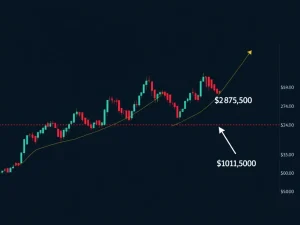**Gemini Earn Dispute:** SEC and Gemini Forge Pivotal Agreement After Three Years

The cryptocurrency world recently witnessed a pivotal development. The U.S. Securities and Exchange Commission (SEC) and Gemini Trust Company announced a significant agreement. This resolution aims to settle their prolonged crypto lending dispute. It marks a crucial moment for regulatory clarity within the digital asset space. This outcome carries profound implications. It could reshape how similar products are offered and regulated moving forward.
Resolving the Gemini Earn Dispute: A Breakthrough Agreement
Almost three years ago, the SEC filed a complaint against Gemini. This action involved allegations related to the Gemini Earn product. Now, the crypto company and the regulator have reached a potential deal. On a recent Monday, both the SEC and Gemini Trust Company filed a status update in court. They informed the US District Court for the Southern District of New York (SDNY) of a “resolution in principle.” This agreement aims to definitively resolve a securities case. The case originated from a January 2023 complaint.
The filing requested that all litigation in the civil case be indefinitely stayed. This stay remains “subject to review and approval” by the Commission. Both parties further committed to filing another status report. This report would be due if the case remains unresolved by December 15. This specific timeline provides a clear deadline for finalization. Such a resolution could bring much-needed closure. It addresses a significant legal cloud hanging over Gemini. The SEC Gemini agreement underscores a mutual desire to conclude this chapter. It also sets a precedent for how future regulatory actions might be approached.
The Genesis Connection and Precedent-Setting Settlements
The securities case originally targeted both Gemini Trust and Genesis Global Capital. The SEC’s complaint, filed in January 2023, alleged serious violations. It claimed Genesis and Gemini “engaged in an unregistered offer and sale of securities to US retail investors.” This activity purportedly occurred between February 2021 and November 2022. The heart of the Gemini Earn dispute revolved around this alleged unregistered offering.
This agreement in principle represents one of the final steps. It concludes the winding down of the case against both firms. Earlier in 2024, the SEC and Genesis announced a separate $21 million settlement. This prior Genesis settlement paved the way. It demonstrated the regulator’s resolve in pursuing these cases. Furthermore, the agency, then under acting SEC chair Mark Uyeda, informed Gemini in February. It would not recommend pursuing an enforcement action. This decision pertained to a separate investigation against the company. This distinction is vital. It suggests the current agreement specifically addresses the Earn program. It also indicates a potentially clearer path for Gemini regarding other regulatory inquiries.
Understanding the Allegations and Crypto Lending Regulation
The core of the SEC’s case focused on the Gemini Earn Program. Through this program, investors sent crypto assets to Genesis. They expected Genesis to pay interest on these holdings. The SEC contended that both companies raised “billions of dollars’ worth of crypto assets.” Crucially, they did so “principally from US retail investors.” The regulator emphasized that this happened “without registering with the regulator.” This lack of registration formed the central pillar of the complaint.
The January 2023 complaint further alleged specific deficiencies. It stated, “[I]nvestors lacked material information about the Gemini Earn program.” This information would have been “relevant to their investment decisions.” The complaint concluded that “Defendants have instead only made selective and inadequate disclosures.” This assertion highlights the SEC’s consistent stance. They view many crypto lending products as securities. Therefore, they demand full compliance with federal securities laws. This outcome significantly impacts the future of crypto lending regulation. It sends a clear message about transparency and disclosure requirements. Platforms offering similar interest-bearing products must take note.
Navigating Regulatory Scrutiny: What It Means for Investors
The resolution of this case offers a measure of clarity. For investors impacted by the Gemini Earn program, it provides a pathway. While the agreement’s specific terms for investor redress are pending, a settlement typically includes provisions. These provisions aim to compensate affected parties. The SEC’s action here reinforces its role. It acts as a protector of retail investors in the digital asset market. The case underscored the risks associated with unregistered offerings. Investors often operate without the full disclosures required by law.
This development also influences broader market sentiment. It suggests that regulators are actively addressing past issues. They are also establishing clearer boundaries for future operations. Companies engaging in similar activities must evaluate their offerings. They need to ensure compliance with existing and evolving frameworks. This proactive approach could foster greater trust. It might encourage more mainstream adoption of regulated crypto products. Conversely, it warns against the allure of high yields without proper regulatory oversight. The ongoing push for clear crypto lending regulation is paramount. It protects consumers and ensures market integrity.
The Winklevoss Twins’ Influence on Crypto Policy
Beyond the direct legal proceedings, the Winklevoss crypto policy involvement adds another layer. Gemini co-founders Cameron and Tyler Winklevoss have maintained significant political ties. They were notable financial and personal supporters of former US President Donald Trump. This support extended through his 2024 campaign. Their influence continues to be observed.
The twins were reportedly present during the signing of the GENIUS stablecoin bill. This highlights their direct engagement with legislative efforts. Furthermore, they reportedly pressed Trump to reconsider a key nomination. This concerned Brian Quintenz as chair of the US Commodity Futures Trading Commission (CFTC). The White House subsequently asked a Senate committee to delay a hearing on Quintenz’s nomination. This delay occurred before an August recess. As of Monday, no other hearing had been scheduled. This sequence of events suggests a direct impact.
Last week, Quintenz himself released screenshots of texts. These were between himself and the Winklevosses from July. The texts reportedly suggested they were looking for “certain assurances” regarding enforcement actions. These assurances were sought if his nomination were to move forward. This situation underscores the intricate relationship. It exists between influential crypto figures and federal policy-making. It also highlights the industry’s desire for favorable regulatory environments. The SEC Gemini agreement resolution occurs within this complex political landscape.
Gemini’s Public Offering Amidst Regulatory Challenges
Amidst these legal and political maneuvers, Gemini also pursued significant corporate milestones. Gemini began its initial public offering (IPO) recently. This occurred on a Friday. The company reportedly raised $425 million. This was achieved through the sale of 15.2 million shares. This IPO marks a major step for the exchange. It signifies its intent to expand and grow.
The timing of this IPO is noteworthy. It coincided with the ongoing regulatory discussions. The resolution of the SEC Gemini agreement could be particularly beneficial. It potentially removes a major regulatory overhang. This could make Gemini a more attractive investment. It offers a clearer operational path. For the broader crypto market, Gemini’s IPO success is significant. It demonstrates continued investor confidence in digital asset companies. Even with stringent regulatory environments, growth opportunities persist. The company’s ability to navigate both market demands and regulatory hurdles is crucial. This will define its long-term success.
Future Implications for Crypto Lending and Regulation
The resolution of the Gemini Earn dispute serves as a landmark event. It provides crucial clarity for the entire digital asset space. This SEC Gemini agreement underscores the SEC’s unwavering commitment. They aim to regulate crypto products, especially lending offerings, as securities. This approach demands strict adherence to disclosure requirements. The industry, therefore, must adapt to these evolving frameworks.
For crypto lending platforms, this outcome sets a significant precedent. It emphasizes the need for comprehensive registration. It also highlights the importance of transparent disclosures. Companies must ensure investors receive all “material information.” This includes details about risks, operations, and financial health. Failure to comply risks similar enforcement actions. This resolution could also spur innovation in compliant ways. New models for interest-bearing crypto products may emerge. These models would integrate regulatory requirements from their inception.
Furthermore, this development contributes to the ongoing debate. It shapes the future of crypto lending regulation globally. As jurisdictions worldwide grapple with digital asset oversight, the US approach often influences others. This resolution offers a template. It shows how regulators can engage with crypto firms. The goal is to balance innovation with investor protection. The crypto market continues to mature. Clear and enforceable rules become increasingly vital. They ensure stability, integrity, and sustainable growth for the entire ecosystem.
Conclusion
The SEC Gemini agreement marks a decisive step forward. It resolves a prominent Gemini Earn dispute. This resolution brings greater certainty to the crypto lending sector. It reinforces the SEC’s regulatory authority. It also highlights the critical need for compliance. As the digital asset landscape evolves, such agreements are crucial. They define boundaries and foster trust. The industry must embrace transparency and robust regulatory adherence. This will ensure its long-term viability and protect participants. This pivotal moment underscores a maturing market. It moves towards greater accountability and clarity.









